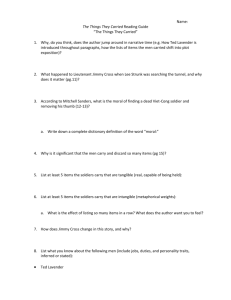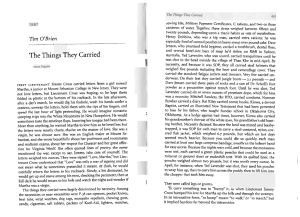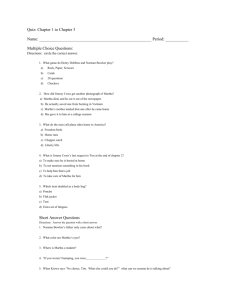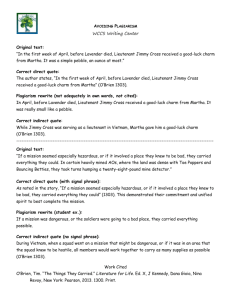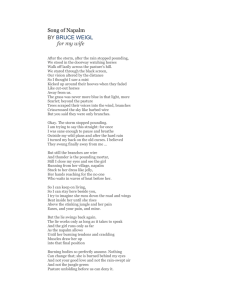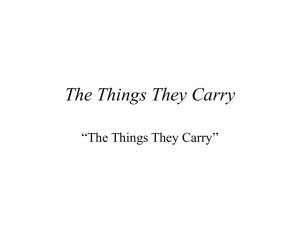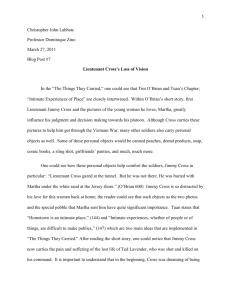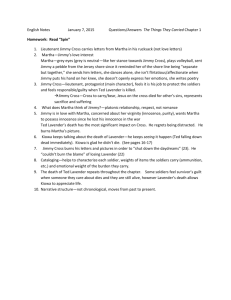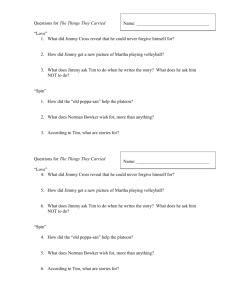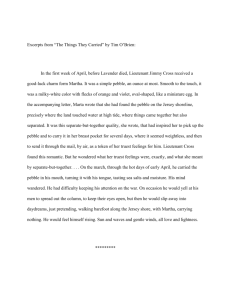Chapter 1 The Things They Carried
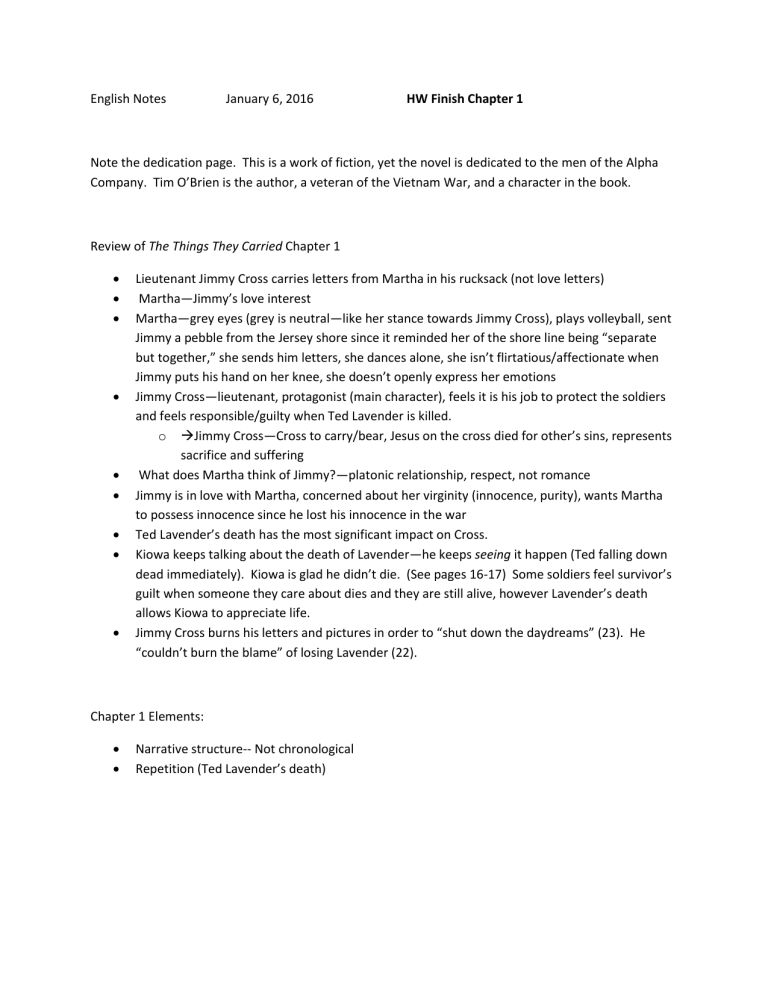
English Notes January 6, 2016 HW Finish Chapter 1
Note the dedication page. This is a work of fiction, yet the novel is dedicated to the men of the Alpha
Company. Tim O’Brien is the author, a veteran of the Vietnam War, and a character in the book.
Review of The Things They Carried Chapter 1
Lieutenant Jimmy Cross carries letters from Martha in his rucksack (not love letters)
Martha—Jimmy’s love interest
Martha—grey eyes (grey is neutral—like her stance towards Jimmy Cross), plays volleyball, sent
Jimmy a pebble from the Jersey shore since it reminded her of the shore line being “separate but together,” she sends him letters, she dances alone, she isn’t flirtatious/affectionate when
Jimmy puts his hand on her knee, she doesn’t openly express her emotions
Jimmy Cross—lieutenant, protagonist (main character), feels it is his job to protect the soldiers and feels responsible/guilty when Ted Lavender is killed. o Jimmy Cross—Cross to carry/bear, Jesus on the cross died for other’s sins, represents sacrifice and suffering
What does Martha think of Jimmy?—platonic relationship, respect, not romance
Jimmy is in love with Martha, concerned about her virginity (innocence, purity), wants Martha to possess innocence since he lost his innocence in the war
Ted Lavender’s death has the most significant impact on Cross.
Kiowa keeps talking about the death of Lavender—he keeps seeing it happen (Ted falling down dead immediately). Kiowa is glad he didn’t die. (See pages 16-17) Some soldiers feel survivor’s guilt when someone they care about dies and they are still alive, however Lavender’s death allows Kiowa to appreciate life.
Jimmy Cross burns his letters and pictures in order to “shut down the daydreams” (23). He
“couldn’t burn the blame” of losing Lavender (22).
Chapter 1 Elements:
Narrative structure-- Not chronological
Repetition (Ted Lavender’s death)
These soldiers carry (or hump) their homes on their backs.
Consider the literal things they carry and the emotional things they carry.
Each man also carries a green plastic poncho (for rain, ground covering, or to cover dead bodies), grenades, ammunition, large compress bandages, items under SOP (Standard
Operating Procedures), flak jacket and ghosts.
Henry Dobbins—big man, carries extra food (What’s important to him? Food!), carries a large amount of ammunition and weaponry. He wears his girlfriends’ pantyhose around his neck for comfort, insecticide
Dave Jensen—clean man, carries dental floss, socks, vitamins high in carotene (will help night eyesight), takes precaution against trench foot , empty sandbags, rabbit’s foot.
Ted Lavender—scared, carries tranquilizers, drugs (dope) perhaps to cope with his fear. When he is shot dead, he falls down immediately—it isn’t like in the movies. (He is killed coming back from urinating.) He is covered with the green poncho. “He was dead weight” (7). Soldiers smoked his dope after his death and burned down the village of Than Khe.
Norman Bowker—carried a diary, a boy’s thumb
Mitchell Sanders—carried condoms, the 26 pound radio (he’s the RTO—Radio Transmission
Officer), brass knuckles
Lee Strunk—carried a slingshot, tanning lotion
Lieutenant Cross—in love with Martha, stares at her pictures, is preoccupied with her –he recalls going to see the movie “Bonnie and Clyde” with her and when he touches her knee. This is his attempt at bravery/being courageous. Daydreaming of her provides an escape from the harshness of war. The fact that he didn’t continue to make a move on her makes him feel like a coward. He carries the responsibility of the lives of his men. He also carries heavy weaponry, a compass, map, code books, binoculars, a pebble from Martha, and her picture. He feels guilty when Ted Lavender dies—he was daydreaming.
Rat Kiley—carried M&Ms and brandy, comic books, morphine, plasma and malaria tablets, surgical tape (things medics need)
Kiowa—carries his grandfather’s hatchet, New Testament (devout Baptist), pair of moccasins, carries his grandmother’s distrust of the white man –he is Native American
List of weapons (pages 5- 7)—catalogues the weapons used, the nature of war, the amount of weapons and ammunition used to save oneself or kill another
“They carried all they could bear, and then some, including a silent awe for the terrible power of the things they carried” (7).
Martha sent Lieutenant Cross a pebble and a letter. She explains that she found it by a stretch of shoreline that was “separate but together” he begins to become jealous that someone would be with her. Lieutenant Cross kept the pebble in his mouth while he daydreamed of walking with Martha along the coast of the Jersey Shore. His imaginative flights deliver him
from the gravity of war.
“They all carried ghosts” (9).
“Imagination was a killer” (10). Imagination—you can daydream or worry about being killed, if rats have rabies.
“The things they carried were determined to some extent by superstition”:
Cross, his pebble;
Dave Jensen a rabbit’s foot;
Norman Bowker carried a thumb cut from a VC corpse of a 15/16 year old boy;
Boy was at the bottom of an irrigation ditch, burned, with flies in his mouth, carrying rice and ammunition—another senseless death
Soldiers also carry stationary, pins, flares, razors, tobacco, candles, nail clippers, canvas bags of beer, etc. They carried diseases, lice, the land of Vietnam itself, fungus, decay, gravity. (See pages 13-14)
“They shared the weight of memory” (14).
“They carried their own lives. The pressures were enormous” (15).
“…they would never be a loss for things to carry” (15).
Cross feels responsible for Lavender’s death---he feels that he “would have to carry [the death] like a stone in his stomach for the rest of the war” (16).
